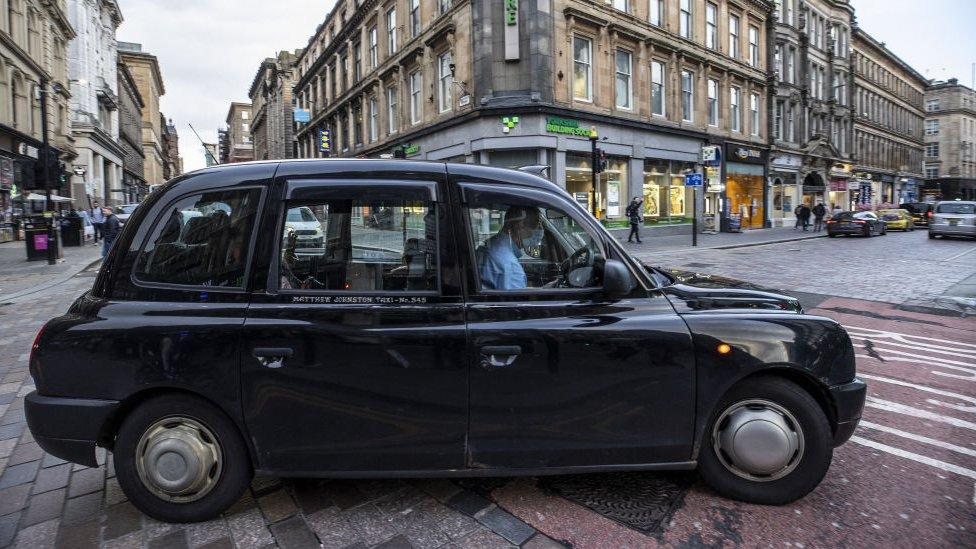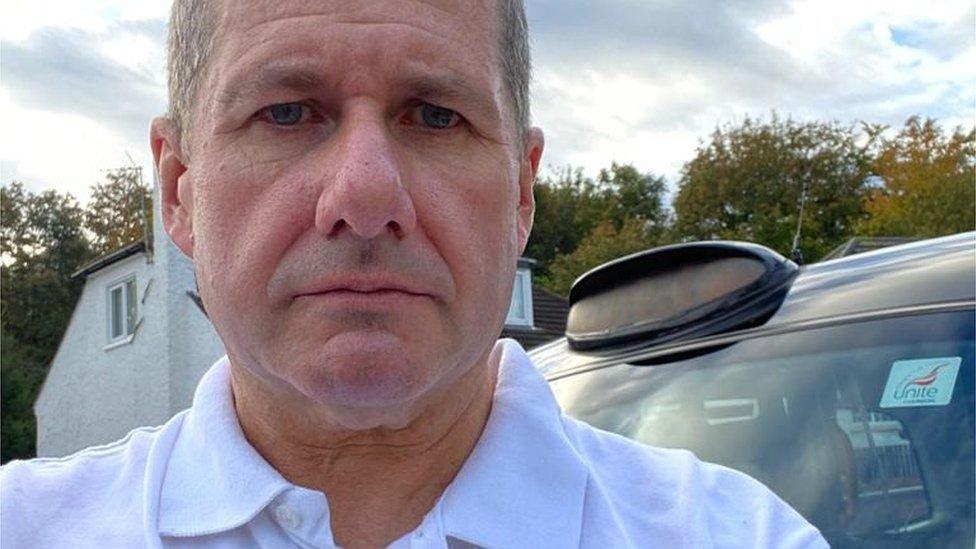No Glasgow low emission zone reprieve for taxi drivers
- Published

Taxi drivers say they should be given more time to comply with the rules after two years of Covid
The full roll-out of Glasgow's low emission zone (LEZ) will go ahead in 2023 despite objections from taxi drivers, the city council has said.
More than 70% of Glasgow's taxis are currently not LEZ compliant and will need to be replaced or retro-fitted with new engines before next June.
The Unite union wants drivers to be given more time to get vehicles ready.
Glasgow City Council said "practical support" has been available to those most affected by the new rules.
The phase two roll-out will extend the LEZ to all vehicles from 1 June 2023 and is being introduced by the council to reduce pollution and improve air quality.
After that date petrol cars made before 2005 and diesels built before September 2014 will not be allowed in the zone.
Aberdeen, Dundee and Edinburgh are also introducing LEZs, but they will not be enforced until 2024.
'I'll be looking for a job'
Scottish government grant schemes to help taxi drivers who need to upgrade or change their vehicles closed in February.
Taxi driver Simon Mitchell told BBC Scotland that not enough had been done to support the sector after his income "disappeared" during the pandemic.
"There was no work right through lockdown. I've got two taxis, one of them is sitting idle because I can't get a driver because so many guys left the trade," he said.
"They're now expecting me to go out and purchase a Euro 6 vehicle. Both of mine are Euro 4s so they're too old to get the retrofit conversions done to make them Euro 6.
"If I'm required to change two taxis in just over a year's time, I'll be looking for a job."
Mr Mitchell added: "I understand that they need to do something for climate control, I get that, but they need to take into consideration the fact that we've had two years of a pandemic.
"They're going to put hundreds of people out of a job."
Glasgow City Council figures show that just 395 cabs out of 1,419 were compliant with the LEZ standards in December 2021.
Calum Anderson, Unite's Glasgow cab section chairman, said an exemption period for taxis would have allowed the trade to renew cabs at a "sustainable level".

Calum Anderson believes an extension would allow more time for secondhand electric cabs to become available
"A new zero emission taxi costs in excess of £60,000 with the average age of a taxi driver being 57. Finance is incredibly hard to get," he said.
"There are currently next to no second-hand taxis available that would be capable of retrofitting to Euro 6 standard.
"By extending the period for taxis, there will be a greater availability of second-hand electric cabs available which will get more diesels off the road quicker than existing plans would allow."
Glasgow's LEZ will cover an area from the M8 motorway to the north and west, the River Clyde to the south and Saltmarket and High Street to the east.
The enforcement will require all vehicles going into the zone to meet the required Euro 6 emission standards, otherwise drivers will face a penalty charge.
Transport Scotland said more than 150 taxis had been retrofitted through £1.4m of funding from the Scottish government, with 415 interest free loans also agreed to help finance new electric taxis.
'Extensive' engagement
The LEZ retrofit fund for taxis closed on 21 February, although taxi drivers can register their interest in future funding rounds, external.
Glasgow City Council said all had been "carefully considered" but that there was a "pressing need" to address the negative health impacts of air pollution.
Councillors agreed on Monday there were be no further changes to Glasgow's LEZ, including the implementation timetable.
Anna Richardson, city convener for sustainability and carbon reduction, said: "Seeking to restrict the most polluting vehicles from the zone area is the right thing to do to ensure that we mitigate the disproportionate impacts of air pollution upon the most vulnerable in our society.
"I'm heartened that the full roll-out of our LEZ continues to make progress and that we are another step closer toward increasing its effectiveness by widening its reach to include all vehicles."
The councillor added that the authority had "engaged extensively" with the taxi trade since the LEZ was initially proposed.